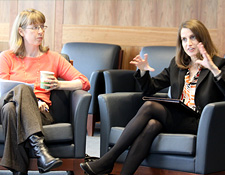WORKSHOPS: Meeting of Minds Sparks Ideas
By Eric Williamson
 William & Mary Law Professor Laura Heymann was presenting her paper on what makes commodities such as art and consumer products authentic during a recent Law and Humanities Workshop at the Law School when a typical interchange sparked a not-so-typical idea.
William & Mary Law Professor Laura Heymann was presenting her paper on what makes commodities such as art and consumer products authentic during a recent Law and Humanities Workshop at the Law School when a typical interchange sparked a not-so-typical idea.
Professor Anne Coughlin, who teaches criminal law, said the paper inspired her to think about confessions and evidence as well. "There are times when a court is making a decision about a particular 'production' — a confession by a person to a crime, or some document someone is giving — and the court has to decide: Is this thing authentic?"
"That's an angle that I would not have thought deeply about on my own," Heymann said following the workshop, "and is great proof of the value of discussing one's work with scholars outside of one's immediate field of research."
The workshop series, sponsored by the Law School's Program in Law & Humanities, is designed to generate just this kind of creative feedback for scholars presenting their works in progress, said professor and program director Charles Barzun. "One of the points of the workshop is to allow the speaker to get questions from multiple disciplinary perspectives," he said. "This is not required as a formal matter but rather tends to happen naturally, as different questions occur to people, depending on their scholarly focus."
The workshops are open to any UVA professors or students interested in reviewing and commenting on the scholarship of invited speakers, who include scholars from across the country in fields such as English, anthropology, literature, art theory, and film criticism.
Peter Brooks, a comparative literature professor now at Princeton University, helped launch the Program in Law & Humanities and its workshop series in 2004, during his tenure at UVA as a University Professor. He was joined in building the program and its workshop that year by Law School faculty members Anne Coughlin, Jon Cannon, and Dan Ortiz. Brooks, a renowned humanities scholar who taught for decades at Yale, is scheduled to return to Virginia to present a paper at the March 18 workshop. The workshops take place several times during the school year.
Law Professor Kerry Abrams joined the faculty in 2005 and began working with Brooks soon after to help run the workshop. She has been actively involved ever since and serves on a committee that helps choose the speakers, along with Barzun and Coughlin, and professors Molly Bishop Shadel and Deborah Hellman.
"We try to achieve a balance of methodological approaches" in deciding who will present, said Abrams. "We also consult with other faculty to ascertain whether there are scholars they would like to meet and engage with and who fit well within the program parameters."
Barzun and Abrams said both the workshop and the Program in Law & Humanities provide a space for students to examine legal questions through a humanistic lens, and offer faculty a community that engages in and understands interdisciplinary law and humanities scholarship. Apart from the workshop series, the program also hosts occasional conferences, including the upcoming March 2014 annual meeting of the Association for the Study of Law, Culture, and the Humanities.
Though the workshop features scholars from across the country, Barzun and Abrams said it also ultimately aims to foster greater interdisciplinary scholarship at UVA in particular.
This past spring, Mai-Linh Hong ’08, a Ph.D. candidate in English at UVA, presented a paper at the workshop focusing on the intersections of literature, culture, and the law.
"Having Mai-Linh return to the Law School as a developing law and humanities scholar really brought the purposes of the program full-circle," Abrams said. "We hope that she is just the first of many students who will start their scholarly careers in our classrooms, just as we are proud that we have sent so many lawyers out into the world of practice with critical and analytical skills honed by studying interpretation from a variety of perspectives."




